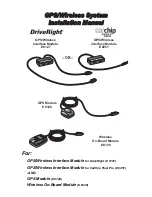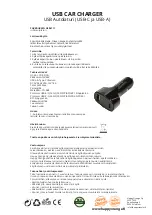
X
Clean the wheels/tyres, wheel arches and the
underbody of the vehicle with a water jet.
This increases road grip, especially on wet
road surfaces.
X
Check the wheels/tyres and wheel arches for
trapped foreign objects and remove them.
Trapped foreign objects can damage the
wheels/tyres and may be flung out from the
vehicle when you continue driving.
X
Check the underbody for trapped branches or
other parts of plants and remove them.
Trapped branches or other parts of plants
increase the risk of fire and can cause dam-
age to fuel lines, brake hoses and the rubber
bellows of axle joints and drive shafts.
X
Clean the brake disks, brake pads and axle
joints, particularly after operation in sand,
mud, grit/gravel, water or similarly dirty con-
ditions.
X
Check the entire floor assembly, the tyres,
wheels, bodywork structure, brakes, steering,
chassis and exhaust system for any damage.
X
Check the service brake for operating safety,
e.g. carry out a brake test.
X
If you notice strong vibrations after driving off-
road, check the wheels and drive train for for-
eign objects again. Remove any foreign
objects which can lead to imbalances and
thus cause vibrations.
Driving in mountainous areas
!
Vehicles with a diesel engine: the oper-
ating safety of the diesel engine is guaranteed
up to an altitude of 2,500 m above sea level.
You may exceed this altitude for short peri-
ods, e.g. in mountainous terrain. Do not drive
at altitudes above 2,500 m for extended peri-
ods. You could otherwise damage the diesel
engine.
When driving in mountainous areas, note that
the power output of the engine, and with it its
gradient climbing capability, decrease with
increasing altitude. Please take note of this par-
ticularly when driving with a trailer in mountain-
ous areas.
The maximum permissible trailer loads are valid
for journeys at altitudes up to 1000 m above sea
level with gradients up to 12%.
!
Vehicles with engine power output
below 100 kW: reduce the total weight of the
vehicle/trailer combination for journeys with
a trailer at altitudes over 1000 m. A reduction
of 5% of the permissible total weight of the
vehicle/trailer combination per 500 m above
an altitude of 1000 m is a guide value. You
may otherwise overload the clutch of the vehi-
cle. Overloading the clutch leads to excessive
and premature wear and may damage it.
When driving on roads at an altitude above
1000 m with only slight gradients of less than
8% you do not need to reduce the total weight
of the vehicle/trailer combination..
Information on maximum permissible trailer
loads can be found in your vehicle registration
papers and on the vehicle identification plate
(
Y
page 379) or under "Trailer loads"
(
Y
page 391).
When driving at altitudes of 2500 m above sea
level or greater, the ECO start/stop function is
no longer available.
Notes on braking on downhill gradients can be
found in the "Braking" section (
Y
page 181).
Driving systems
Cruise control
General notes
Cruise control maintains the speed of the vehi-
cle for you. It brakes automatically in order to
avoid exceeding the set speed.
Use cruise control if road and traffic conditions
make it appropriate to maintain a steady speed
for a prolonged period. You can set any speed
from 30 km/h upwards in increments of 1 km/h
and 10 km/h.
If you have set
miles
as the unit for the digital
speedometer, you can set any speed from
20 mph in increments of 1 mph and 5 mph.
Changing the display unit for the digital speed-
ometer and the distance:
R
on vehicles without steering wheel buttons
(
Y
page 227)
R
on vehicles with steering wheel buttons
(
Y
page 239)
Cruise control should not be activated when
driving off-road or on construction sites.
Cruise control may be unable to maintain the
stored speed on uphill gradients. The stored
speed is resumed if the uphill gradient evens out
and the vehicle's speed does not fall below
Driving systems
185
Driving and parking
Z
















































